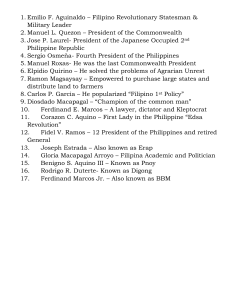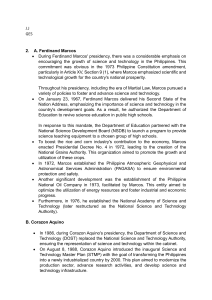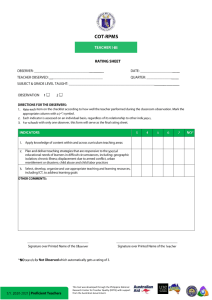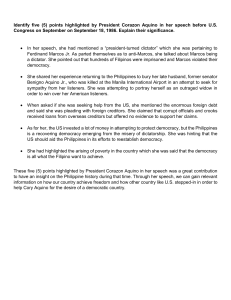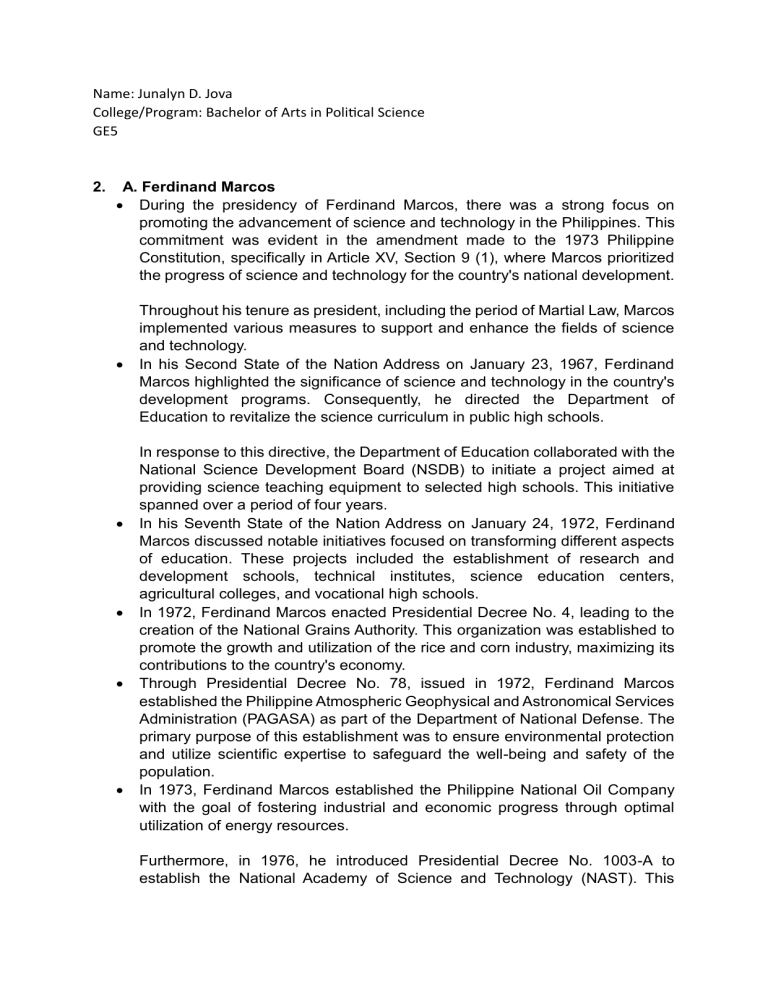
Name: Junalyn D. Jova College/Program: Bachelor of Arts in Political Science GE5 2. A. Ferdinand Marcos During the presidency of Ferdinand Marcos, there was a strong focus on promoting the advancement of science and technology in the Philippines. This commitment was evident in the amendment made to the 1973 Philippine Constitution, specifically in Article XV, Section 9 (1), where Marcos prioritized the progress of science and technology for the country's national development. Throughout his tenure as president, including the period of Martial Law, Marcos implemented various measures to support and enhance the fields of science and technology. In his Second State of the Nation Address on January 23, 1967, Ferdinand Marcos highlighted the significance of science and technology in the country's development programs. Consequently, he directed the Department of Education to revitalize the science curriculum in public high schools. In response to this directive, the Department of Education collaborated with the National Science Development Board (NSDB) to initiate a project aimed at providing science teaching equipment to selected high schools. This initiative spanned over a period of four years. In his Seventh State of the Nation Address on January 24, 1972, Ferdinand Marcos discussed notable initiatives focused on transforming different aspects of education. These projects included the establishment of research and development schools, technical institutes, science education centers, agricultural colleges, and vocational high schools. In 1972, Ferdinand Marcos enacted Presidential Decree No. 4, leading to the creation of the National Grains Authority. This organization was established to promote the growth and utilization of the rice and corn industry, maximizing its contributions to the country's economy. Through Presidential Decree No. 78, issued in 1972, Ferdinand Marcos established the Philippine Atmospheric Geophysical and Astronomical Services Administration (PAGASA) as part of the Department of National Defense. The primary purpose of this establishment was to ensure environmental protection and utilize scientific expertise to safeguard the well-being and safety of the population. In 1973, Ferdinand Marcos established the Philippine National Oil Company with the goal of fostering industrial and economic progress through optimal utilization of energy resources. Furthermore, in 1976, he introduced Presidential Decree No. 1003-A to establish the National Academy of Science and Technology (NAST). This institution was later restructured and renamed the National Science and Technology Authority. B. Corazon Aquino In 1986, during Corazon Aquino's presidency, the Department of Science and Technology (DOST) replaced the National Science and Technology Authority, ensuring the representation of science and technology within the cabinet. On August 8, 1988, Corazon Aquino introduced the inaugural Science and Technology Master Plan (STMP) with the goal of transforming the Philippines into a newly industrialized country by 2000. This plan aimed to modernize the production sector, advance research activities, and develop science and technology infrastructure. The Free Public Secondary Education Act of 1988, also referred to as R.A 6655, was implemented during this period, providing free education up to the secondary level. Additionally, the "Science for the Masses Program" was introduced to promote scientific and technological literacy among the Filipino population. C. Fidel V. Ramos Fidel V. Ramos recognized the role of science and technology in positioning the Philippines as a New Industrialized Country (NIC). During his presidency, he implemented significant programs to promote and advance the field of science and technology. Local initiatives like the "Doctors to the Barrio program" were introduced to enhance healthcare services. These innovative programs were successful, as evidenced by the increase in life expectancy from 67.5 years in 1992 to 69.1 years in 1995. In 1993, the Science and Technology Agenda for National Development (STAND) was established. Its key priorities included supporting industries, coconut industry development, and addressing domestic needs identified by the President's Council for Countryside Development. Additionally, the Department of Trade and Industry (DTI) focused on exporting winners identified by STAND. Several laws were enacted during Fidel V. Ramos' tenure that significantly impacted the field of science and technology. These included the Magna Carta for Science and Technology Personnel (Republic Act No. 8439), the Science and Technology Scholarship Law of 1994 (Republic Act No. 7687), the Inventors and Invention Incentives Act (Republic Act No. 7459), and the Intellectual Property Code of the Philippines (Republic Act No. 8293). D. Joseph Estrada During President Joseph Estrada's administration, two significant legislations were passed: The Philippine Clean Air Act of 1999 (Republic Act No. 8749) aimed to protect and preserve the environment while promoting the sustainable development of natural resources. The Electronic Commerce Act of 2000 (Republic Act No. 8792) prohibited computer hacking and facilitated the growth of new businesses emerging from the Internetdriven New Economy. Additionally, in his inaugural State of the Nation Address, President Estrada launched a comprehensive program to implement cost-effective irrigation technologies. He emphasized a shift away from welfare assistance programs, prioritizing access to basic healthcare, nutrition, and education for those who couldn't afford it. Furthermore, he expressed his commitment to expediting the establishment of science high schools in every province. E. Gloria Macapagal Arroyo Under the administration of Gloria Macapagal Arroyo, the science and technology sector in the Philippines experienced significant progress and was referred to as the "Golden Age" by Secretary Estrella Alabastro. The term "FILIPINNOVATION" was coined to highlight the country's efforts in becoming an innovation hub in Asia. Efforts were made to enhance the science and technology education system, with a focus on strengthening institutions like the Philippines Science High School (PSHS). These institutions emphasized science, technology, and mathematics in their curriculum, aiming to nurture talent and involvement in the sector. Republic Act No. 9367, also known as the "Biofuels Act," was enacted to promote the development and usage of biofuels in the country. This legislation aimed to provide a more affordable alternative to gasoline for energy production while also benefiting the environment through cleaner emissions. Republic Act No. 10601 was implemented to enhance the efficiency of land and water resources in the agricultural and fisheries sector. This law, known as AFMech (Agriculture and Fisheries Sector through Mechanization), aimed to improve mechanization practices for better productivity. F. Benigno Aquino Jr. Under President Benigno Aquino Jr.'s administration, the MOSES Tab (Monitoring and Operating System for Emergency Services) was utilized as a tablet device. It served as a real-time information platform for weather and flood reports from organizations such as DOST, PAGASA, and Project NOAH. The device enabled local officials, including barangay-level authorities, to access accurate data for informed decision-making, aiming to mitigate extensive damage and casualties. Additionally, the Philippine government launched Diwata 1 or Microsatellite 1, which was equipped with specialized cameras. This satellite was designed to capture and provide 3,500 high-resolution images, supporting land monitoring and the study of weather pattern changes. In 2014, President Aquino honored four individuals with the prestigious recognition of National Scientists for their remarkable contributions to the scientific field. Gavino C. Trono (Seaweed Biodiversity), Angel C. Alcala (Biodiversity in Aquatic Ecosystems), Ramon C. Barba (Induction of Flowering Mango), and Edgardo D. Gomez (Coral Reef Conservation) were acknowledged and celebrated for their exceptional achievements in their respective areas of expertise. G. Rodrigo Roa Duterte Under President Duterte's administration, Republic Act No. 11035 was approved, establishing the Balik Scientists Program. This initiative provides additional incentives and benefits to Filipino experts, scientists, inventors, and engineers who opt to return to the Philippines and contribute their knowledge and expertise. President Duterte also authorized the establishment of the Philippine Space Agency, which serves as the central coordinating body for space-related activities and policies across different government agencies. Additionally, the Philippine government successfully launched Diwata 2, the country's second microsatellite. Diwata 2 incorporates radio communication technology and carries an amateur radio payload, primarily aimed at supporting disaster relief efforts.
